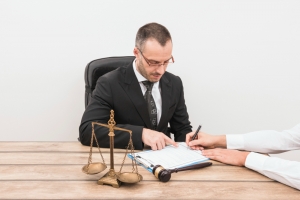Speeding accidents can change your life in a few seconds. The physical pain, financial pressure, and emotional stress can leave lasting damage. Fatal crashes often lead to rising hospital bills, lost work hours, and a complex claims process that feels overwhelming and unfair.
Many people don't know where to begin or who to trust. Insurance adjusters may seem helpful but often offer less than what you deserve. Without clear steps, you may miss key deadlines, lose critical evidence, or agree to low settlements.
This article outlines how to take control after a speeding accident. You'll learn what actions to take, who to contact, and how to build a strong claim. Each section will help you move forward, claim what is rightfully yours, and reduce the stress that comes with seeking justice.
Understand Your Legal Rights After a Speeding Accident
If a speeding driver caused your injuries, you have the right to seek compensation. That right depends on your state's insurance laws and how fault is assigned. In most places, proving the other driver's fault is the first step.
Some states follow a fault-based system. That means the at-fault driver or their insurer must pay. Others use a no-fault system. In that case, your own insurer covers certain costs, regardless of fault. Still, serious injuries may let you step outside the no-fault rule.
You may recover medical expenses, therapy costs, and lost income. You can also seek compensation for pain, mental stress, and reduced quality of life. These are called damages. Knowing your rights and what you can claim is vital. It helps you make better decisions and protect your future.

Consult a Personal Injury Attorney Early
Hiring a personal injury attorney early helps you build a strong case. An attorney reviews the facts, checks the evidence, and explains your legal options. This guidance helps you make informed decisions from the start.
Most injury attorneys work on a contingency fee basis. That means you don't pay unless you win. This setup removes upfront costs and makes legal help more accessible. If your case involves a car crash, contacting a speeding accident lawyer in Topeka can provide focused legal support.
An attorney also handles all talks with the insurance company. This reduces your stress and protects your rights. Insurers often try to settle for less than your claim is worth. Legal representation helps ensure you get fair compensation. Early legal advice helps avoid costly mistakes and strengthens your case from day one.
Gather Crucial Evidence Immediately
You need to act fast after a car accident. Evidence can fade, get lost, or become unclear. Memories fade, road conditions change, and damaged property may be repaired or discarded.
Take clear photos of the scene, your injuries, and any property damage. Keep all damaged items, such as clothing or gear, in a safe place. Collect names and contact details of all witnesses, including vehicle occupants. Their statements can support your version of events.
Get a copy of the police report. It often includes important details that help prove fault. Start a journal as soon as possible. Record your symptoms, treatments, and emotional challenges. These notes can show the full impact of the accident. Timely and detailed records help strengthen your claim and support your case.
Seek Prompt and Ongoing Medical Attention
You should see a doctor immediately after the accident, even if injuries seem minor. Early treatment can prevent complications and start your recovery sooner. It also links your injuries directly to the crash.
Continue with all recommended follow-up visits and therapies. Each visit builds a clear, dated medical record. This record shows your injury's progress and supports your legal claim. Gaps in care can create doubt or weaken your case.
Delays in treatment give insurers a reason to question your injuries. They may argue your pain isn't serious or unrelated to the accident. Quick and steady medical care helps protect both your health and your rights. Make sure to keep copies of all medical reports, prescriptions, and bills.
Notify the Insurance Companies Properly
Report the accident to your insurance company as soon as possible. This applies even if you were not at fault. Prompt reporting protects your rights and keeps your coverage active.
Be careful when speaking with insurance adjusters. Don't admit fault or guess about your injuries. Never give a recorded statement without first speaking to a lawyer. What you say can affect your claim.
There are two ways to file a claim. You can file with your own insurer or with the at-fault driver's insurer. In fault-based states, you'll usually deal with the other driver's insurer. In no-fault states, your own insurer handles the claim. Knowing which process applies helps you avoid delays and protects your claim's value.
File a Personal Injury Claim or Lawsuit If Necessary
You should file your injury claim as soon as possible. Most claims begin with a demand letter sent to the at-fault driver's insurer. It outlines your injuries, expenses, and requested compensation. Settlement talks usually follow.
If those talks fail or the offer is too low, a lawsuit may be needed. Filing suit increases pressure on the insurer to settle fairly. It also gives you the chance to present your case in court if needed.
Conclusion
Speed-related crashes can turn your life upside down. Injuries, bills, and stress pile up fast. You may feel overwhelmed, confused, and unsure of what to do next. Still, you have the power to act and protect your future.
Every step you take brings you closer to justice. Start by reviewing where you are in the process. Then take the next step with purpose. Seeking help, gathering records, and knowing your rights all make a difference.






